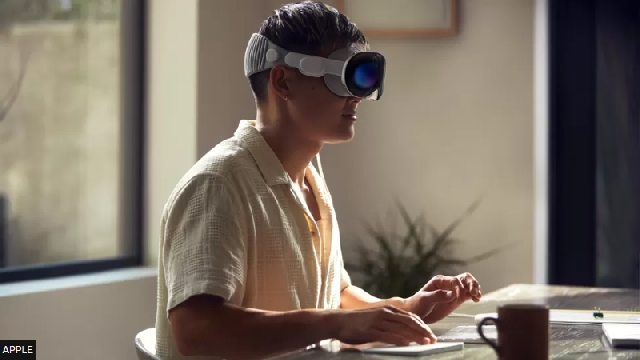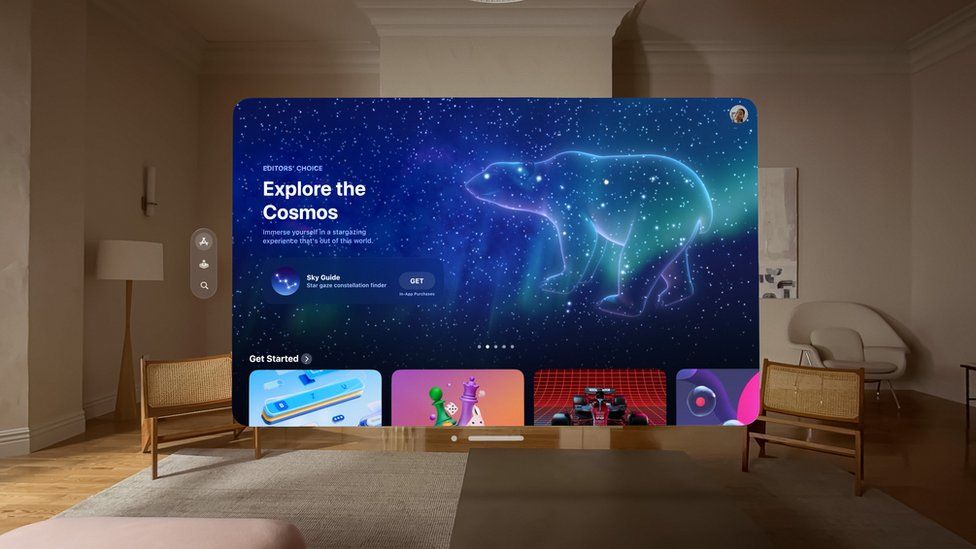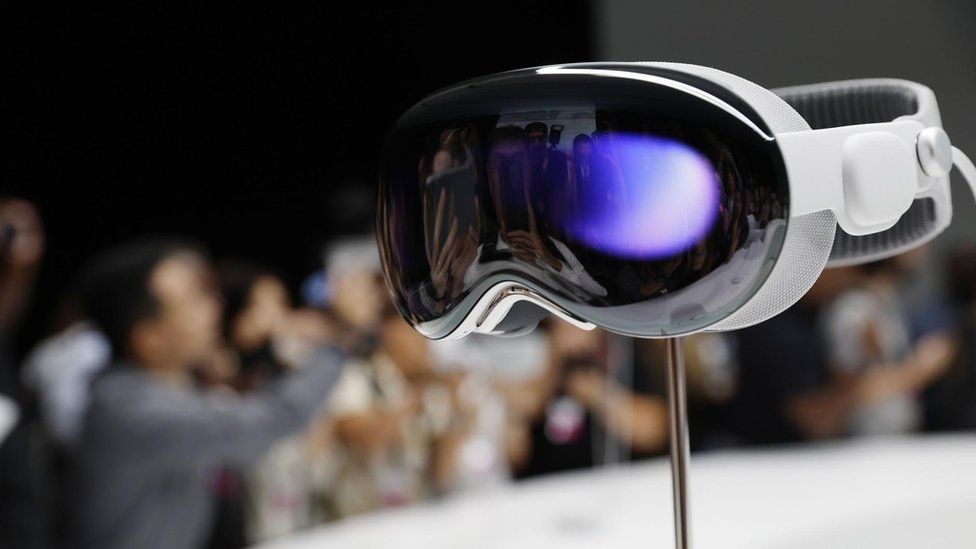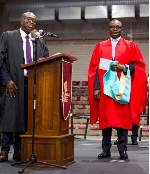Apple unveils $3,499 mixed reality headset
 Apple's new hardware device; the mixed reality headset
Apple's new hardware device; the mixed reality headset
Apple has unveiled a much-anticipated augmented reality headset, Apple Vision Pro, in its first major hardware launch for almost a decade.
Apple chief executive Tim Cook said the new headset "seamlessly blends the real world and the virtual world".
The tech firm also announced its latest iPhone operating system, as well as updates to MacBook Air.
The headset has a two-hour battery life, costs $3,499 (£2,849) and will be released early next year in the US.
The cost is considerably higher than virtual reality headsets currently on the market. Last week Meta announced its Quest 3 - which costs $499.
Apple said little about generative artificial intelligence - the buzzy technology that is the talk of Silicon Valley.
The company's share price fell slightly during the announcement, made at a developer's conference at Apple Park, the company's headquarters, in Cupertino, California.
The BBC was among the media outlets at the event, and technology editor Zoe Kleinman was one of the first people in the world to try out the headset.
"Since current boss Tim Cook took over in 2011, with the possible exception of the Watch, Apple has been unable to come up with the kind of world-changing product of the past," she said.
"Have they done it here?"
'Ski goggles'
Apple Vision Pro looks different to similar headsets on the market - and is more reminiscent of a pair of ski goggles than a virtual reality headset.
Apple used the phrase "augmented reality" to describe what the new device does.
Augmented reality, also known as mixed reality, superimposes virtual objects in the world around us - enabling us to mix reality with virtual reality by looking through a screen.
"It's like your phone but right in front of you - big, bright and bold, wherever you are," Ms Kleinman said.
In letting you do things like watch videos of your family blowing out birthday candles or immerse yourself in your photography by making your panoramic photos life-size, she says it is pitched as a device which is "very much about being part of your daily life", unlike many other headsets on the market geared primarily towards immersive gaming.
 | How the Vision Pro's new app store will appear for headset users
| How the Vision Pro's new app store will appear for headset users
Users can access apps, watch movies, and write documents in a virtual world. But so far, there is little evidence of a big market for this kind of wearable tech.
"It's still at the end of the day a VR headset," said Ms Kleinman. "Apple is going to have to have an awful lot of content to throw at this when it ships early next year.
"And of course the other thing is the price point - $3,499 is a lot of money."
Hartley Charlton, senior editor of MacRumors, was unsure how much the headset would appeal to the general public.
"It won't appeal to mainstream consumers at first on account of its extremely high price point and immediate shortcomings as a first-generation device, such as its separate wired battery pack," he said.
But he said Apple has a track record of "overcoming scepticism" about new devices, and has historically encouraged people to "part with their cash to add a new gadget to their repertoire".
 | Journalists and developers at Monday's conference saw a glimpse of the headset
| Journalists and developers at Monday's conference saw a glimpse of the headset
In his sales pitch, Mr Cook said the headset allows users to "see, hear and interact with digital content just like it's in your physical space".
It is controlled by using a combination of your hands, eyes and voice - such as tapping your fingers together to select, and flicking them to scroll.
The announcement comes a week after Meta and Lenovo announced new iterations of their pre-existing virtual reality headsets, that do not superimpose objects on to a view of the real world.
Meta has also invested heavily in mixed reality - but right now the sector is struggling.
The headset market saw a 54% drop in global sales last year, according to the International Data Corporation.
Apple's last major hardware release was for the Apple Watch device in 2015.
Thomas Husson, of Forrester Research, told BBC News it may take time for Apple's new headset to take off.
"The overall AR/VR space has been a bit overhyped over the past few years with the metaverse and that kind of experience," he said. "That's the reason why I think it will take a bit more time.
"Having said that, if I told you 10 to 15 years ago that people would be ready to pay almost $2,000 for a mobile phone, I don't think many people would have said they would be willing to pay that."
Source: bbc.com
Trending News

Ghana chamber of mines urges government to pause mining royalty reforms
12:50
Ghana Library Authority begins review of 55-year-old law establishing it
12:42
HIV cases rise in Volta Region amid poor condom use among youth
13:15
NDC Legal Director expresses concern over confusion surrounding Daddy Lumba’s funeral
12:20
Energy Minister bags PhD in Development Finance from University of Stellenbosch
12:28
CCAL proposes Atewa centenary and green festival to Okyenhene
13:06
Soldiers deployed to Jamaica: Ghana committed to int'l humanitarian service - President Mahama
13:41
Central Regional Land Reclamation Committee reclaims 10 hectares
12:29
Aare Atayeto Oodua of the Source: President Mahama to receive revered Yoruba chieftaincy title
15:34
Ghana to end import of vaccines through new Vax and Pharma Ghana project
12:51



